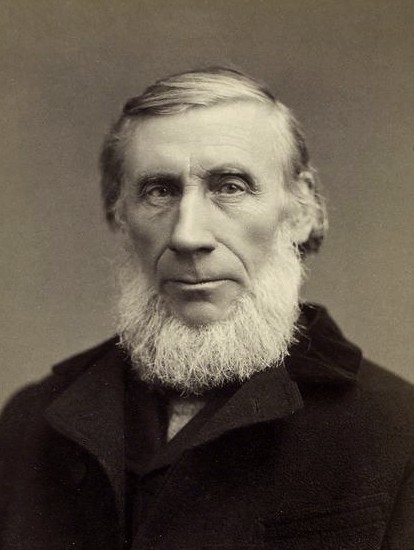
John Tyndall (right; 1820–1893), is, of course, the Anglo-Irish physicist remembered for demonstrating the greenhouse effect. But he was also a supporter of Darwin, and a member, along with his friend Thomas Henry Huxley, of the x Club, which promoted evolutionary ideas, opposed religious interference in science, and sought to increase the authority of science in society. (The other members were William Spottiswoode, George Busk, Edward Frankland, T. A. Hirst, John Lubbock, Joseph Dalton Hooker, and Herbert Spencer; all but Spencer were Fellows of the Royal Society, and four of them—Spottiswoode, Lubbock, Huxley, and Hooker—were pallbearers at Darwin’s funeral, as I observed: part 1, part 2.) So it isn’t particularly surprising to find that Tyndall, like Huxley, is occasionally misleadingly quoted by creationists.
Writing in Reports of the NCSE in 2010, Michael D. Barton traced a fine example. Seeing a report in The New York Times of a lecture in which it was claimed that Tyndall admitted that “evolution belongs to the twilight of conjecture,” Barton identified the original source: Tyndall’s 1878 essay “Virchow and Evolution,” in which he discussed a speech by the German physician and biologist Rudolf Virchow expressing opposition to evolution. There Tyndall mentioned a talk of his own in which he referred to “the theory of evolution applied to the primitive condition of matter as belonging to ‘the dim twilight of conjecture’” (emphasis added). Clearly he was not talking about biological evolution. But he was nevertheless subsequently misrepresented as having described evolution as conjectural, as Barton relates.
I recently encountered two similar misleading quotations of Tyndall, involving “Virchow and Evolution,” at about the same time. The first is from J. W. Porter’s Evolution—A Menace (1922). As I related in “Martin’s Mysterious Myrmidons,” Porter (1863–1937) was a Baptist minister in Lexington, Kentucky, who was at the forefront of a campaign to ban the teaching of evolution in the Bluegrass State in the early 1920s. In a sermon, he declared, “Darwinism would be run out of Kentucky if it took every cent the Baptist people of the Commonwealth had to do it.” Porter’s campaign was responsible for the first legislative attempt to ban the teaching of evolution: Kentucky’s House Bill 191, introduced in 1922. The bill was defeated—by a single vote. Observing the furor from the University of Kentucky was a young college student named John T. Scopes.
Anyhow, in chapter 3, “Evolution Falsely Explains Origin of Life,” of Evolution—A Menace, there appears a long paragraph teeming with various quotations from scientists about the origin of life. Among them is the following, attributed to “Prof. Tyndall”:
Again, Science has no explanation of the origin of life. The living organism instead of being the product of physical forces, controls these forces for its higher forms, functions and purposes. I share with Virchow’s opinion that the theory of evolution, in its complete form, involves the assumption that at some period or other in the earth’s history, there occurred what would now be called spontaneous generation; but I agree with him that the proofs of it are wanting. I also hold with Virchow that the failures have been so lamentable that the doctrine is utterly discredited.
From “I share” onward, the words are, more or less, from Tyndall’s essay. There are minor if sloppy differences, and a sentence quoted from Virchow that appeared between the sentences is missing without any indication, but otherwise it’s a faithful rendition.
The first two sentences, however, are not from Tyndall at all. With the exception of the word “Again,” they are from James Dwight Dana’s Manual of Geology (fourth edition, 1895: the sentences in question seem not to appear in the previous editions), in a chapter on “Archaean Time.” There’s no shame in quoting Dana, to be sure: he was a major figure in American science. It’s a little ironic, though, since Dana, originally unsympathetic to evolution, started to shift his view: in the second edition of the Manual (1875) he concedes that it is “most likely to be sustained by further research” that “[t]he evolution of the system of life went forward through the derivation of species from species, according to natural methods not yet clearly understood, and with few occasions for supernatural intervention.” But the misattribution is egregious.
As far as I can tell, the chimeric passage that combines Dana and Tyndall began with Porter. And it may have ended with him as well: with the exception of a few appearances of the passage in the Bible Champion—in which, as William J. Morison explains in his article on the magazine in The Conservative Press in Twentieth-Century America (1999), “Antievolutionism in particular became a constant theme … throughout the 1920s”—I don’t see any further instances of it in the literature. The Dana quotation appears (in, e.g., Philip Mauro’s Evolution at the Bar [1922]); the Tyndall quotation appears (in, e.g., Luther Tracy Townsend’s Collapse of Evolution [1905], which was constantly plundered for such gems); but rarely were they merged. Thank heaven for small mercies! In part 2, I turn to the second misleading quotation from Tyndall.

